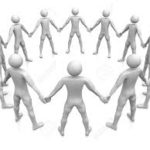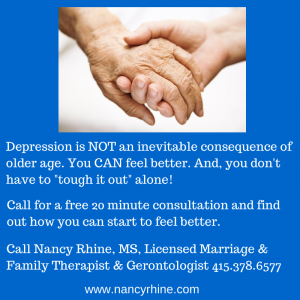Advocacy and Mental Health and Aging
Taking a News Fast for Mental Health
 Mental Health and the News
Mental Health and the News
Something I see more and more recently is how troubled and even distraught many of my clients are about the state of our country. When I ask them about how much they are watching the national news, many of them say, “Every morning and every evening.” What I ask them how it makes them feel they report “Terrible! I’m so upset (angry, frustrated, disappointed, fearful) about what is going on!”
These folks may be rimobolan Republicans, they may be Democrats or no party affiliation. It’s not about political leanings as much as it is about their memories of how various politicians they admired were once able to communicate across party lines to “put country first and get things done”. It greatly  concerns my clients that this bipartisan spirit does not seem to be happening anymore. They get so mad about it that their blood pressure and overall stress levels are not healthy. This is the situation for many Americans now, young or old or in-between.
concerns my clients that this bipartisan spirit does not seem to be happening anymore. They get so mad about it that their blood pressure and overall stress levels are not healthy. This is the situation for many Americans now, young or old or in-between.
My senior clients, many of whom are retired, are educated, hard-working, middle class Americans who care about our country. They are also facing plenty of issues related to aging, illness, having less energy, figuring out their relationships with adult kids and grandkids, their identities and value in their older years, the big existential questions of life, and yes, oftentimes depression and anxiety. The news media these days can make them sick!
So, we have been experimenting with various ways they can try taking a “news fast”. One woman in her 80’s reported that she stopped watching the news on television where the sound bothered her so much – the music, the strident tones of the the newscasters voices and the video graphics. She has found that, for her, *reading* the news in small, manageable bites is fine. She stays current with anything important and can read the words without the over-stimulation of noise.
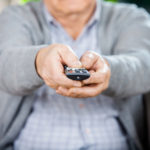 Others have stopped watching or reading altogether for a few days at a time to see how this impacts their spirit of well-being and mood. Another client is being creative by playing around with getting her news through the late night comedy shows and via short comedic clips on YouTube. She reports that she feels much calmer and that laughing more feel great!
Others have stopped watching or reading altogether for a few days at a time to see how this impacts their spirit of well-being and mood. Another client is being creative by playing around with getting her news through the late night comedy shows and via short comedic clips on YouTube. She reports that she feels much calmer and that laughing more feel great!
The point is that constant drumbeat of 24/7 cable news shows, along with media hungry politicians and pundits, can seriously contribute negatively to people’s emotional health. Take a break from it to see if you sleep better or just feel a little less down. Finding some balance that works for you may not be the same as what works for your friend or family member. The important thing is to find that balance and to remember that the good things that happen in life tend not to be reported in the media and that focusing on the good things all around you is a great help to your mental health.
So… consider taking a “News Fast” from time to time and see how you feel! The news will still be there when (if) you come back to it!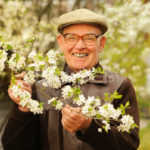
Successful Aging Takes a Team!
Successful Aging Takes A Team!
Let’s talk about why it’s critical to their quality of life to have a strong support team around seniors who are growing older.
Why?
Because I see so many older people in my private practice who face, for example, situations where they are grappling with:
- family members or loved ones with very strong opinions about what is best for them – opinions danabol that may or may not be informed and wise
- *no* family members or close friends at all to advocate for them
- a primary care physician who is prescribing medications but not following them in after-care. What is known as the “diagnose and adios” routine.
- a specialist or two who is also prescribing – say for instance a cardiologist or endocrinologist – but who is not tracking the interaction of *all* of the medications involved
- a psychiatrist who may be also be treating and prescribing psychiatric medications
- possibly a nutritionist, alternative health practitioner or two prescribing supplements, vitamins and minerals which may all be fine but which also carry side effects that can contribute to mood problems.
Way more often than not, there is very little, if any, communication and coordination amongst the health professionals. This coordinator function may have been done in the past by the primary care doc who managed the broad perspective overview of how each of his patients were doing. But nowadays primary docs are under so much time pressure in their practices that they just do not have time take on this role.
In order to build that coordinated team which will support an individual’s successful aging, it takes someone stepping into the role of being a skilled ADVOCATE. A person who knows how to coordinate effective communication amongst team members and who is in charge of reaching out on behalf of the patient to represent their concerns. Someone who can help the patient communicate their concerns and questions to other team members, and who also helps the patient remember the answers and instructions of doctors. Team members need to work in concert with each other, supporting the various lens through which each patient is viewed.
All of this process needs to be done with the utmost RESPECT for each patient where the patient has TRUST in the advocate that he or she is representing the wishes of the patient towards the goal of the best possible quality of life at any stage.
Gerontologists and mental health professionals who understand the importance of building good communication and coordination amongst care teams can be invaluable to the patient and family. Sometimes, it is care managers who provide this role, sometimes it’s an adult child, and sometimes it’s gerontological counselor.
Whoever it is that takes the lead in this role, a support team that is identified, built, coordinated and in good communication, will result in a patient who is much more likely to thrive and much less likely to fall through the cracks.
This is the health care situation for older people in our country today. Just the facts. And totally doable to navigate through it successfully. With help. With a solid, caring team.
Bringing Balance into Our Lives as We Grow Older
 As we get older, we are exposed to increasing loss and stressors. These can be deaths of loved ones and family members. Sometimes it’s illness, it may be chronic pain. Or watching people we care about encounter difficulties and running into more problems ourselves.
As we get older, we are exposed to increasing loss and stressors. These can be deaths of loved ones and family members. Sometimes it’s illness, it may be chronic pain. Or watching people we care about encounter difficulties and running into more problems ourselves.
Joan Erikson, the renowned psychologist and wife of psychologist Eric Erikson, talked about needing to let go of things as we climb up the hill of getting older. Old habits, old concerns, old worries, old ways of being – we have to start looking at those and discarding those that have become too heavy to continue to carry. She said:
“Everybody says it’s a good idea to lighten your load. It’s like walking up a hill. And then you realize that the load that you’re carrying is not worth the trouble, it’s not worth the strength that it takes to keep it with you. And you begin to just gladly drop this bit here and this bit here and be freer to get up that steep hill.”
This “purging” effect as one of my therapist friends calls it, involves letting go of a range of things. It can be not eating as much and therefore extra weight. It can be possessions which we have accumulated and carried around with us in our homes. Those possessions which seem to multiply by themselves and we look around finding ourselves surrounded by too many things. Time to let go!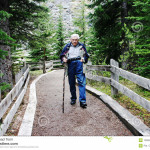
Sometimes it’s relationships we are looking at and letting go of. Old friends who were wonderful in one season of our lives may not feel nurturing or right anymore. This is not a blame and shame process. This is normal. Friends, colleagues and associates come and go. “Culling” and honing and winnowing are all practical terms having to do with earth and sometimes farming. They are good metaphors for how we are gardening through our lives.
To extend the metaphor, plants need room to grow and thrive. If they, or we, are too crowded, our growth is stymied. How much room we need as individual humans is a very personal journey and decision. It may differ at various times of our lives because numbers of relationships, too, have seasons.
A coping mechanism mentioned by many mental health practitioners and mindfulness teachers is bringing more of our attention to positive things in our lives. Big things, but also the small little day to day, hour to hour, minute to minute things that delight us. And by delight, I mean that bring light into our hearts. It might the sight of a beloved child, pet, the smell of a sweet sweet rose, the taste of something delicious, the feel of the warm sun on our face, the rays of sunshine filtering down through tall trees, the sound of the ocean, etc.
Those enjoyments can help bring us balance in and of themselves, and *especially* so when we pause and savor them for more than a second. In fact, brain research has shown that it takes the brain at least *10 seconds* to take a momentary experience and be able to register it into memory. 20 or 30 seconds is better.
So, for starters, a simple thing to do to move towards balance is to take the time to notice positive experiences in our lives, note them with all of our senses where possible, and stay with them for a few seconds. A regular practice of this will attune our brain to noticing more of these experiences and help bring balance into our perspectives and lives. Simple and powerful at the same time.
A New Year & A New Perspective
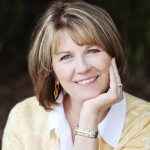 A New Year & A New Perspective
A New Year & A New Perspective
Dear friends and colleagues in the healing arts,
2015 presented me with some interesting challenges. After the death of my beloved mother and the near death and continued illness of my husband, I wondered how we healers can continue to serve our patients when we ourselves are in the midst of tough times. Maybe some of you have come up against this question too.
What I discovered is, as songwriter Leonard Cohen writes, “The birds they sang at the break of day. Start again I heard them say. Don’t dwell on what has passed away or what is yet to be. Ring the bells that still can ring. Forget your perfect offering. There is a crack in everything. That’s how the light gets in.”
It’s this last part that has surprised me. What an unexpected gift is the grace and light that can emerge out of adversity. What I am learned continually deepens both my work and my home life.
As we get older, we find ourselves adding to our toolkit of life skills. Mindfulness tools have reentered my life and work in a big way. And so has my intention to reach a much wider audience through teaching nationally about conscious aging. The need and demand for navigation help is so great as the boomer generation enters the unfamiliar terrain of older life.
If you have friends, family or patients in these populations below who you think I might be able to help or if you have questions yourself, please feel free to reach out anytime:
- People in their 50’s, 60’s and 70’s waking up to their own sense of aging – often through illness or other changes in themselves or their loved ones. They seek answers, solutions, and guidance.
- Adult children of aging parents who feel confounded and frustrated about how to best help their parents through a myriad of difficult circumstances. They are the sandwich generation with aging parents, children and often grandchildren too.
- Families where adult children and aging parents need to and want to come to some new understandings and find a closeness now to the extent they can while they can still can.
- People in their 80’s and early 90’s who are facing their last years with all that that entails – memories, regrets, fears, peace and contemplation – all healthy parts of this stage of life. Having a genuinely caring nonjudgmental skilled listener is so valuable.
You might already know that there are very few psychotherapists in Marin who have advance training in gerontology. With my expertise in the fields of aging, communication, business, medicine and psychology, I am uniquely qualified to help your midlife and older patients, friends and family.
My offices are in Mill Valley and San Anselmo. Telephone appointments are also available for people who do not live close by. I provide a free initial phone consultation. And if I can’t help, I can often steer people to other beneficial resources.
With warm wishes for a peaceful 2016,
Nancy Rhine, MS, LMFT, CPG
415-378-6577
nrhine@gmail.com
Ageism in Modern America
While cruising Facebook this morning I came across an article posted by Paula Span, an author I respect so much for her insightful blog posts when she was featured as the writer for The New Old Age for the NY Times. Out of a budget cut, her weekly blog was cut but she still writes for the Times sometime and posts on her FB page. Here is the link to the article she posted which was written by the chief of geriatrics at Columbia University: America’s Bias Against Older Women Must Stop
The article has to do with the flurry of ageist comments in the media lately having to do with Caitlin Jenner. Not comments so much that were disparaging about her transformation from Bruce to Caitlin but comments that were denigrating of older women. Demeaning comments, snide jokes, general put-down’s about older bodies, in particular older female bodies.
This topic and more importantly this phenomenon is so widespread and so ubiquitous in our culture that it is overwhelming when considered. And that overwhelm can easily lead to increased poor self esteem on the part of older women, denial and fighting against “aging” thus the billions spent on anti-aging products, and depression. I see this depression so very commonly in my counseling work with older women, espeically those in their 60’s and 70’s.
There is a common thread of complaints under the heading of ageism whether we use that word or not. The experience is of: being the butt of disparaging and cruel jokes, feeling devalued, ridiculed, infantalized and invisible. of not counting, that they don’t matter.
 I wonder about our fear of women and women’s power in this culture. We women do have some kind of power when we are young and beautiful. Perhaps that is instinct that we are attractive when we can procreate. Perhaps we are also considered more valuable then because we “consume” therefore Wall St and the media value us. That doesn’t make much sense tho’ when you consider that older women and older people in general are big consumers and oh by the way voters as well.
I wonder about our fear of women and women’s power in this culture. We women do have some kind of power when we are young and beautiful. Perhaps that is instinct that we are attractive when we can procreate. Perhaps we are also considered more valuable then because we “consume” therefore Wall St and the media value us. That doesn’t make much sense tho’ when you consider that older women and older people in general are big consumers and oh by the way voters as well.
No, there is something intrinsic and deeply rooted in why this culture devalues older women to such an extent. More than they do older men although there is devaluing there too. Is it related to fear of mortality and fear of dying? Is it the fear of becoming superfluous and needy? We know that our culture puts huge emphasis on independence and me-ness. Cross interdependence is not a big part of our cultural tone. And/or does ageism towards older women have to do with latent resentment towards primary attachment figures who predominantly are mothers emerging later when our mothers or ourselves are now in a vulnerable position. Payback time in other words?
I believe that we lose out as a culture and a people when we do not value our older women and listen to what they have to teach us. Margaret Mead told a story about the old does of the red tail deer herds in Alaska. In times of drought or severe storms, it was the old does who had the memory of out of the way watering holes or sheltering cliff where they could find refuge from the storms. The herd rallied behind and old does towards safety.
I worry about this way we have of devaluing and demeaning our older women. We are in times of crisis. We need all the wisdom we can find. Denigrating and oppressing and discounting an entire segment of our population is anti-survival and anti-wisdom. I hope we can change. I hope that we boomers can push back against too-often-accept stereotyping and dismissing of older women. Our survival may just depend on it.
Aging, is and always has been, a team sport!
 I am a big fan of some of some of the leaders who I consider the pioneers in reshaping how we think of aging in this country. One was Dr. Robert Neil Butler, MD who first coined the word “ageism”, started the first geriatric medicine program in the country (at Mt Sinai Medical Center), was the first Director of the National Institute on Aging and won the Pulitzer Prize for his groundbreaking book on aging called “Why Survive? Being Old in America”. Sadly Dr Butler passed away in 2010. But he left us a legacy of his work.
I am a big fan of some of some of the leaders who I consider the pioneers in reshaping how we think of aging in this country. One was Dr. Robert Neil Butler, MD who first coined the word “ageism”, started the first geriatric medicine program in the country (at Mt Sinai Medical Center), was the first Director of the National Institute on Aging and won the Pulitzer Prize for his groundbreaking book on aging called “Why Survive? Being Old in America”. Sadly Dr Butler passed away in 2010. But he left us a legacy of his work.
Another leader who is still very active is Dr Bill Thomas, MD, geriatrician and a professor at the Erickson School at the University of Maryland, Baltimore County. He has founded two movements that aim to reshape nursing-home care: The Eden Alternative and the Green House Project. Dr. Thomas his wife developed the Eden Alternative in the early 1990’s as a bodybuilding-seriously.net philosophy to deinstitutionalize long term care facilities by alleviating the “three plagues” of boredom, helplessness and loneliness. In 2008, The Wall Street Journal named Dr. Thomas one of the 12 most influential Americans shaping aging in the 21st Century. US News and World Report described Dr. Thomas as a revolutionary, “With his startling common-sense ideas and his ability to persuade others to take a risk, this creative and wildly exuberant 46-year-old country doctor has become something of a culture changer–reimagining how Americans will approach aging in the 21st century.”
Here is a sample of some of Dr Thomas’s (for America) revolutionary statements on the plethora of dismal nursing homes in this country:
“One important way we can reduce the fear associated with communal living arrangements, and improve the lives of frail elders and their families, is to abolish nursing homes in America. Currently we have more nursing homes than Starbucks outlets. Our archipelago of institutional long-term care facilities houses 1.6 million elders and adults living with disabilities. Most of them are serving life sentences, stripped of privacy, independence and choice. Ironically, the buildings are aging even faster than the people in them. They won’t survive to house the coming boom of elders. Should we rebuild them, as thousands of developers are already doing, and subject another generation to the cruel embrace of the institution?
The fact that so many people, whose only crime is frailty, are confined in this way is powerful evidence that we live in a deeply ageist society. We dread aging because we associate growing older exclusively with disability, depression, dementia and death. In fact, old age is a complicated life stage with abundant opportunities for growth, joy, meaning and worth. Around the world and through the ages, elders have proven their value as peacemakers, storytellers and sages. They are the glue that holds families and communities together, and we need them now more than ever. “
He writes this in response to the fear that so many old people have about living in groups, and rightly so given the vast majority of the existing models. But, he says, as in the title of this blog post, AGING IS A TEAM SPORT! How I have described it, along these same lines, is that “It takes a village!”, stealing from Hilary Clinton’s old book title. I have seen this over and over, that the highest quality of life belongs to those older people who have a loving and competent circle of family, friends, caregivers, church members, health professionals, etc around them when they need them.
Older people nowadays want to stay home and “age in place”. This is understandable given the alternatives! It’s time for us to create warm, welcoming, vibrant group settings where individuals can have privacy and alone time for contemplation, and friendship and support and connection when they want that to. I’m sure we can figure this out. And we should because the boomers are fast coming down the aging track.
Dr Thomas has started the Green House Project, a new model aimed at creating a real home that provides care but also supports those seeking to redefine the worth and meaning of late life. With support from the Robert Wood Johnson Foundation, more than 100 Green House Project homes have opened in 32 states since 2003, and more than 100 others are in development.
Depression is NOT inevitable in older life.
 Our youth-oriented Western culture seems to tell us that we are all doomed to succumb to debilitating depression as an inevitable part of growing older. This is not true!
Our youth-oriented Western culture seems to tell us that we are all doomed to succumb to debilitating depression as an inevitable part of growing older. This is not true!
Sure, it is true that getting old “ain’t for sissies” as Bette  Davis famously put it. There are a myriad of challenges that confront us. Nobody would argue that! We know what those challenges are – all kinds of changes, losses of various sorts from little things to profound ones, aches and pains, the gamut.
Davis famously put it. There are a myriad of challenges that confront us. Nobody would argue that! We know what those challenges are – all kinds of changes, losses of various sorts from little things to profound ones, aches and pains, the gamut.
But, you can also thrive in later years. It’s about your mindset, your emotional and spiritual practices and your strong support network. The kids called support networks these days, their “posse”. Your posse can be made up of old and new friends, your peers, support group members, family, pets, counselors, trusted doctors and spiritual advisors.
Generally, people like you have an assortment of healthy, tried-and-true coping skills that have gotten you this far in your life. Perhaps now, however, you are encountering an accumulation of situations that tax those skills. It may be time to remember your old skills and to learn new ones. It may likely be time as well to rethink your life’s purpose. Purpose is key to keeping your mood up and your heart content.
What stands in the way? Well, too many times, that old Shame rears its head and tells you that you ought to be able to figure this out on your own, that you ought to be able to just “tough it out” and do it alone or else you’re weak. You can’t burden your children so what to do? As the blue box here says, don’t keep it bottled up inside!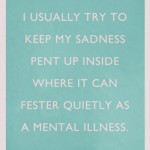
What people often don’t realize is that you are not alone in feeling challenged, stressed, confused, overwhelmed or anxious. These feelings surface when we are going through new phases and transitions in our lives. It’s during these times that it becomes so important to realize you don’t have to reinvent the wheel. There are many practices and tips for how to increase your enjoyment of life in older years.
The important thing is to not give up and figure that just depression goes with the territory. That may be what society tells you, it might be the prevailing attitude. But it is not true. Reach out for help. Counseling and support can turn your life around and help you reclaim your confidence, solid footing and peace of mind. Isn’t it worth a try? What have you got to lose!
Mental Health Access Improvement Act – update!
There is another new sponsor for this important movement towards increasing mental health coverage for all citizens by allowing LMFT’s, for instance, to accept Medicare payments! Follow progress here:
